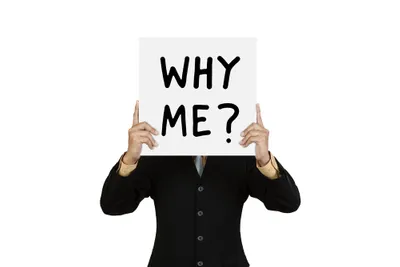Thinking errors are automatic and based on our experiences, culture, upbringing and many other factors. If unchecked, they can generate anger and frustration tearing personal and working relationships apart. Thinking errors (or cognitive distortions) are subtle thoughts that tend to influence our behavior leading to stress and other mental health challenges overtime. Aaron Beck, an American Psychiatrist, developed the theory of thinking errors and suggested that distortions in thinking are habitual and only serve to reinforce negative thoughts and emotions. In fact, thinking errors only keep us in a negative frame of mind, feeling bad about ourselves and others.
So what are they and how do we make a change towards a more positive outlook and quality of life? The first step is to become more aware of habitual, negative thoughts. The second is to challenge the validity of such a thought and find exceptions to the thinking error…
Thinking Error #1: Black and White Thinking
Believing there are two types of people in the world is an excellent example of black and white thinking. This error in thinking may drive the perfectionist into believing that if it can’t be done perfectly; there is no reason to do it at all. Black and white thinking can also be the underlying motivation for the procrastinator when there is a big job to get done. This belief also holds back many people from trying new sports or activities for fear they will not perform well.
Black and white thinking can generate anger, frustration, and self-deprecating thoughts through the establishment of high expectations of self and others. Failing to meet those perfectionist standards may lead to enhanced stress and negative emotions such as disappointment and feelings of failure. By challenging these thoughts and learning to accept more grey than black and white we may find more room for other opportunities without the added fear of failure or being less than perfect.
Thinking Error #2: Overgeneralization
This belief tends to paint people, events, and other experiences with the same brush. If, on a few occasions, we experience disruptive talking in a movie theater, we may conclude that all movie theaters are noisy and we should stay home with the TV instead. In the end, we only rob ourselves of future experiences going to the movies. This thinking error fuels racism, sexism, ageism and can lead to many other negative emotions and behavior like anger and hate.
The key to challenging these negative, inaccurate thoughts is to first become aware they are occurring. The next step is creating a list of times when this did not occur. For example, try to remember the times when the movie theater was quiet or when that spouse picked up after him or herself. Slowly, through the challenging of these thoughts, thinking errors will take up less head space while positive emotions and a reduction in frustration and stress will result.
Thinking Error #3: Personalization
For those that gravitate towards this thinking error, it is easy to assume everyone is looking at us when we walk into the weight room. If we follow someone through a door and she does not hold it for us, we may assume that he or she did that on purpose. As a result, we are left feeling disrespected, hurt, and angry. Personalization also occurs when we compare ourselves to everyone we meet. Who’s better looking? Who’s thinner? Who’s smarter?
This distortion in thinking promotes the belief that everyone is reacting to us in one way or the other. Additionally, personalization may promote a sense of responsibility for any outside event that occurs. For example, the person who feels responsible for someone else’s illness may actively subscribe to this thinking error. In reality, we can only control what we do, say, and feel and cannot control the actions, beliefs, and emotions of others (unfortunately).
Thinking Error #4: Shoulds
Those who “should” all over themselves create a list of what they (and others) should and should not do. Subscribers to this thinking error may believe people should be polite to others or always say hello to strangers on the street. When this doesn’t occur our frustration and anger build along with our stress. An example of this may be the belief that all drivers should signal before turning. Unfortunately, this belief will most certainly lead to anger and frustration on the road.
Another example or application of this distortion in thinking is the shoulds we impose on ourselves. We should exercise. We should eat that salad instead of the nachos. We should get more sleep. When we fail to execute our shoulds we end up feeling guilty and disappointed in ourselves (which fuels the need to lie down with a tub of ice-cream and a spoon). Acceptance may be the key to kicking the shoulds to the curb. Accepting that not everyone has the same set of rules as we do or accepting that we are going to stay on the couch all night with a bag of chips may be all that is needed for enhanced well-being.
Thinking Error #5: Blaming
When we blame others for our problems in life, we are breathing life into this thinking error. This maybe one of the most popular of cognitive distortions and the evidence of it is everywhere. Anyone who watches reality TV will see examples blame (and many other thinking errors) constantly. From politics to the sandbox, blame is everywhere.
One of the most important lessons to learn in managing stress, anger, and overall health is that no one is to blame for our feelings, behaviors, thoughts, and problems, but ourselves (and that’s a very hard pill for many to swallow).
Thinking Error #6: The Fallacy of Fairness
This one is a challenge for many when, after being a good person and doing all the right things, bad things happen. This thinking error caters to the belief that if we do good in the world or are on our best behavior, good things will come our way. When it doesn’t, we become disillusioned, confused, and angry wondering what the hell we did wrong or what we did to deserve this.
The fallacy of fairness is just that…a fallacy. In reality, there are many good, kind, thoughtful people in the world that get nothing but the mucky end of the proverbial stick and there is no reason to justify it.
Thinking Error #7: All People Change
This thinking error is a tough one to grasp for anyone in the fitness and health profession. It relates to the belief that, if there is enough pressure, everyone will change their behavior. Health promoters find themselves shaking their heads in disbelief that people don’t exercise or eat vegetables even after all the money they have spent on public service announcements.
Another popular example is a person within a marriage expecting their partner to change in order to suit him or her. Of course, when he or she remains the same, disappointment, hurt, and even anger may settle in resulting in a strained or limited relationship. Although people can change, change must come from the inside no matter what messages, scare tactics, or other motivations occur on the outside (let’s be honest, a picture of a rotten lung is not going to change the smoker who loves to smoke).
Thinking Error #8: Magnifying or Minimizing
The belief that it is okay to steal the company’s pens because they have an unlimited supply is a good example of minimizing behavior. We may use this form of faulty thinking to excuse our behavior or reduce the attention to it.
Conversely, we may make exaggerate the importance of events or magnify the impact of an occurrence. Hearing someone exclaim the trauma that will occur if he doesn’t get the raise he was expecting or the despair that may be experienced if this pimple gets any bigger are examples of magnifying. The result of either may include negative emotional and physical costs and can be reduced by challenging the reality and probability of such statements.
Thinking Error #9: Filtering
Many of us, when faced with an employee performance review, will focus on the criticism rather than our strengths. A student, after receiving four A’s on her report card will feel like a failure because of the B received in English. Both examples highlight the distortions in thinking created by focusing on the bad rather than the good.
It goes without saying; this pattern of negative thinking can lead to chronic stress, anxiety, frustration, depression, and habitual self-deprecating beliefs. However, change can happen when one is able to shift the focus to what is working well while putting the negative in perspective.
Thinking Error #10: The Fallacy of Control
Those that believe their behavior is controlled by outside forces may be quick to blame others or the environment for their situation. Take, for example, the case of weight loss. If we believe it is the fault of others that we are overweight we may not be as successful losing weight. In addition, the inaccurate thought that places others in control of us may lead to a feeling of victimization and hopelessness.
On the other hand, someone who feels a sense of internal control may believe they are the cause of other’s sadness and problems. The child who blames herself for her parents’ divorce is a good example of this fallacy. By taking a moment to focus on what we can and cannot control may help to take the wind out of this final thinking error.













